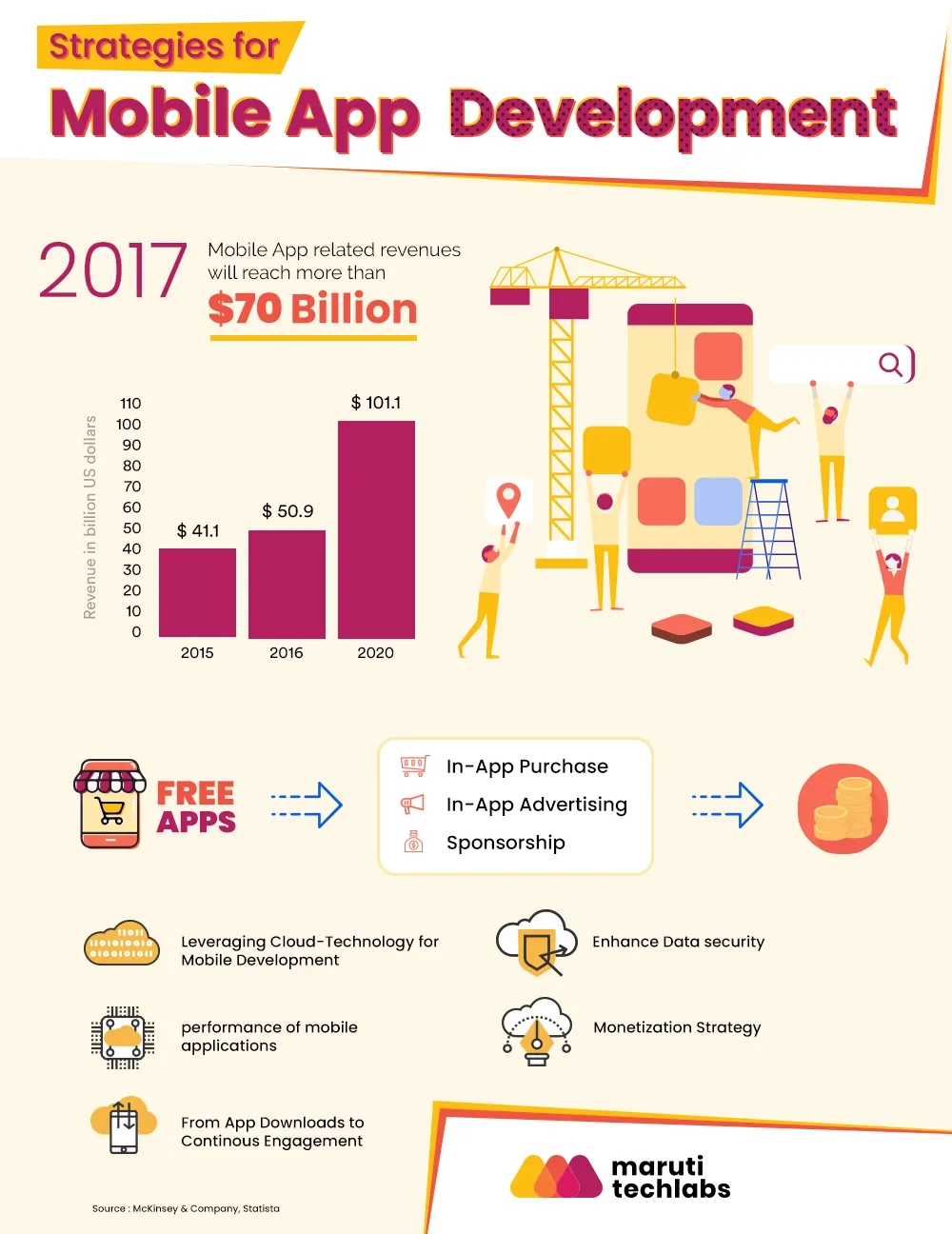5 Key Mobile App Development Strategy for 2024
Introduction
Communication has become swift as mobile apps are fast, visually amusing, interactive and can be easily integrated other mobile features. Smartphones have changed the life forever. The number of consumers accessing information via smartphones, tablets and wearable has been increasing with time. People prefer a mobile app for storing and managing data, on-line shopping, socialising, navigating etc.
Incorporating mobile app with business requires robust strategies. Instead of hastening with app launch, enterprises, and mobile app developers should go for a thoughtful and patient strategy to achieve the best products. Here are five strategies on developing customer engaging and profitable mobile applications.
Top 5 Mobile App Development Strategies for a Successful Launch
A well-defined strategy guides decision-making, from market research and development to marketing and post-launch support. Strategic planning maximizes the app's chances of success by aligning efforts with market demands and user expectations.
But what are those strategies? Let’s find out here.

1. Leveraging Cloud-Technology for Mobile App Development
Cloud-based Mobile Development has various advantages over traditional desktop-based tools. Development on cloud provides benefits like standardisation, flexibility, agility, and operational cost savings making the cloud model too alluring. Companies in the software industry are taking advantage of cloud and all its fantastic benefits: many consumer applications and business applications are now cloud-based such as email, CRM, etc. Developers can develop from anywhere with cloud-based development tools without having to install and maintain the infrastructure. From customer’s perspective cloud-based mobile app development provides a smooth learning curve and a faster on-boarding process for new users.
For strategies to maximize the success of your mobile app development project, trust the expertise of a top mobile app development company. Our custom mobile application development services can help you leverage cloud technology, enhance data security, optimize performance, and develop a monetization strategy that works for your business. With a focus on continuous engagement, our team can help ensure your app is a success from launch and beyond.
2. Enhancing Data Security
The fact is users doesn’t care about data security and privacy while using the apps, hence making it vital for developers to take precautions rather than taking actions after data leakage. Some of the security issues in mobile app development can be insecure data storage, weak server side controls, unintended data leakages, broken cryptography, etc. Companies dealing with money and confidential information avoid cloud-based environment due to security breaches. When using cloud-based development platforms, it is crucial to know what kind of data and user protection mechanisms, techniques and practices are utilized in data centers of service providers. Most of the applications that deal with critical user information connect back to the server. So, you need to take care of any insecure transit that occurs on an insecure Wi-Fi connection. This kind of security is achieved by encryption and SSL (Secure Socket Layer) certificates from trusted provider and if we fail to use the proper SSL libraries, user’s crucial information can be at risk.
3. Performance of Mobile App
Customers hate when the Mobile apps crash or they slow down or hung up for few seconds. As a consequence, customers may leave a one-star rating and bad reviews for the app, abandoning it. Mobile App crashes even causes issues like losing user’s data. Organizations need to consider Memory Management, Software Lifecycle, Inadequate Testing, Network management, Error condition and Exception handling while making mobile app development strategy. Use of third-party service providers such as advertising systems and analytics can hinder the performance of the mobile app
4. Monetization Strategy
Mobile apps are becoming huge businesses. It has been estimated by Analysts that app-related revenues will reach more than $70 billion till 2017. (Source: McKinsey & Company). In-app purchases and in-app advertising are something that companies can strategize before launching the mobile app. Intelligently structuring your mobile apps creates the huge opportunity to convert visitors to buyers. You can initiate freemium apps where basic services are provided for free while all advanced features will be chargeable. The key is to scatter the app capacities in such a way that customer lean towards the feeling of using the chargeable features. This call-to-action should show interconnected features thus provoking users to purchase the entire package ultimately.
In-app advertising no doubt brings revenue but can annoy customers if not executed properly. Mobile ads allow app companies to earn without asking money from their users, removing the cost barrier to purchasing the app and allowing free downloads. Mobile app developing companies goal is to generate huge customer base and gather relevant information to sell to other brands who pay them to place targeted ads in the mobile app. Another approach companies use for making money from free mobile apps is Sponsorship. Here the companies partner with advertisers that provide the app users with rewards for completing certain actions within the app. Here the mobile app earns money by taking a share of revenue from redeemed rewards and also allows to incorporate ads that actually enhances the app’s ability to engage more customers.
5. Shifting Focus from App Downloads to Continuous Engagement
The first focus of mobile app developers is achieving maximum downloads, but an app isn’t successful unless it drives user engagement. Developers should work with the end clients at the design phase to better understand the features that are most in demand. This can be possible with the inbuilt analytics of the Mobile apps. It can even help App Developers understand the user experience across the entire application lifecycle and to measure adoption and engagement. Testing and Analytics both at the design and initial deployment phase will guide companies diagnose data and usability related issues before the outcome is poor rating and bad reputation. Some of the examples of mobile application analytics are the frequency of use, retention, crash reporting, device type, etc.
Moreover, an organisation should standardise its app development tools for better coordination among the developers. The mobile app strategy is essential for enterprises focusing on customer acquisition and retention. Their target is not just providing info about the products but a want to interact with the users to understand and deliver what is in demand. Maruti Techlabs is a mobile application development service company with a team of technical experts who can help you devise a perfect strategy for mobile app development.
FAQs
1. How do I choose the right development approach for my mobile app (native, hybrid, or web)?
Choosing the right development approach depends on various factors, such as your target audience, app complexity, performance requirements, and budget.
- Native apps offer superior performance and access to device features but require separate development for each platform (iOS and Android).
- Hybrid apps use web technologies (HTML, CSS, JavaScript) and can be deployed across multiple platforms with a single codebase, balancing performance and development efficiency.
- Web apps run on web browsers and are accessible across devices but may have limited access to device features.
2. How can I ensure my mobile app provides a great user experience (UX)?
Design an intuitive and visually appealing interface that aligns with user expectations and industry standards. Focus on performance optimization to ensure smooth navigation and responsiveness. Implement user-friendly features and functionalities that simplify tasks and enhance usability.
3. What strategies can I use for effective project management during app development?
Start by defining clear project goals, scope, and timelines. Utilize project management tools such as Agile or Scrum methodologies to organize tasks, track progress, and adapt to changes efficiently.
4. How should I approach mobile app security during the development process?
Begin by conducting a thorough security assessment to identify potential vulnerabilities and risks. Implement best practices such as data encryption, secure authentication mechanisms, and secure coding practices to safeguard against common security threats. Regularly update dependencies and libraries to mitigate vulnerabilities.




















